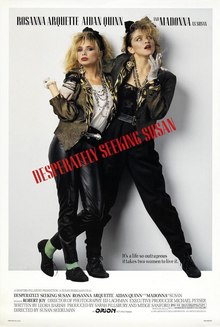
Back Buscant la Susan desesperadament Catalan Hledám Susan. Zn.: Zoufale Czech Desperately Seeking Susan Welsh Susan … verzweifelt gesucht German Cercasi Susan disperatamente EML Desperately Seeking Susan (filmo) Esperanto Desperately Seeking Susan Spanish Desperately Seeking Susan Basque ناامیدانه در جستجوی سوزان Persian Missä olet, Susan? Finnish
| Desperately Seeking Susan | |
|---|---|
 Theatrical release poster | |
| Directed by | Susan Seidelman |
| Written by |
|
| Produced by | Sarah Pillsbury Midge Sanford |
| Starring | |
| Cinematography | Edward Lachman |
| Edited by | Andrew Mondshein |
| Music by | Thomas Newman |
Production company | |
| Distributed by | Orion Pictures |
Release date |
|
Running time | 104 minutes |
| Country | United States |
| Language | English |
| Budget | $5 million[1] |
| Box office | $99.3 million [2] |
Desperately Seeking Susan is a 1985 American comedy-drama film directed by Susan Seidelman and starring Rosanna Arquette, Aidan Quinn and Madonna. Set in New York City, the plot involves the interaction between two women – a bored housewife and a bohemian drifter – linked by various messages in the personals section of a newspaper. The film was Madonna's first major screen role and also provided early roles for a number of other well-known performers, such as John Turturro, Giancarlo Esposito, Laurie Metcalf and Steven Wright.
The screenplay was written by Leora Barish, and is said to have been given an uncredited rewrite by Craig Bolotin.[3] Desperately Seeking Susan was a commercial success and ended as the 31st highest grossing film of the year grossing $55.3 million in the United States.[4] The film received predominantly positive reviews,[4] and both Arquette's and Madonna's acting were critically acclaimed.[5]
Desperately Seeking Susan is noted for its impact on 1980s fashion, especially among the young female audience at that time. The movie's costumery was influenced in part by Madonna's own early style. The film was also noted as a representation of yuppie culture and feminism. Some critics labeled Desperately Seeking Susan as one of the best US films of the year, including Vincent Canby from The New York Times, and eventually, of the decade by publications such as NME and Rolling Stone. Many others have labeled it a cult classic of the 1980s. In 2023, the film was selected for preservation in the United States National Film Registry by the Library of Congress as being "culturally, historically, or aesthetically significant".[6]
- ^ Quart 1989, p. 65
- ^ "Desperately Seeking Susan". Box Office Mojo. Retrieved February 4, 2015.
- ^ "March 1985: Madonna Goes Hollywood with 'Desperately Seeking Susan'". Totally 80's. Retrieved October 10, 2022.
- ^ a b Rettenmund 1995, p. 48
- ^ King 1991, p. 99
- ^ Cite error: The named reference
NFRwas invoked but never defined (see the help page).